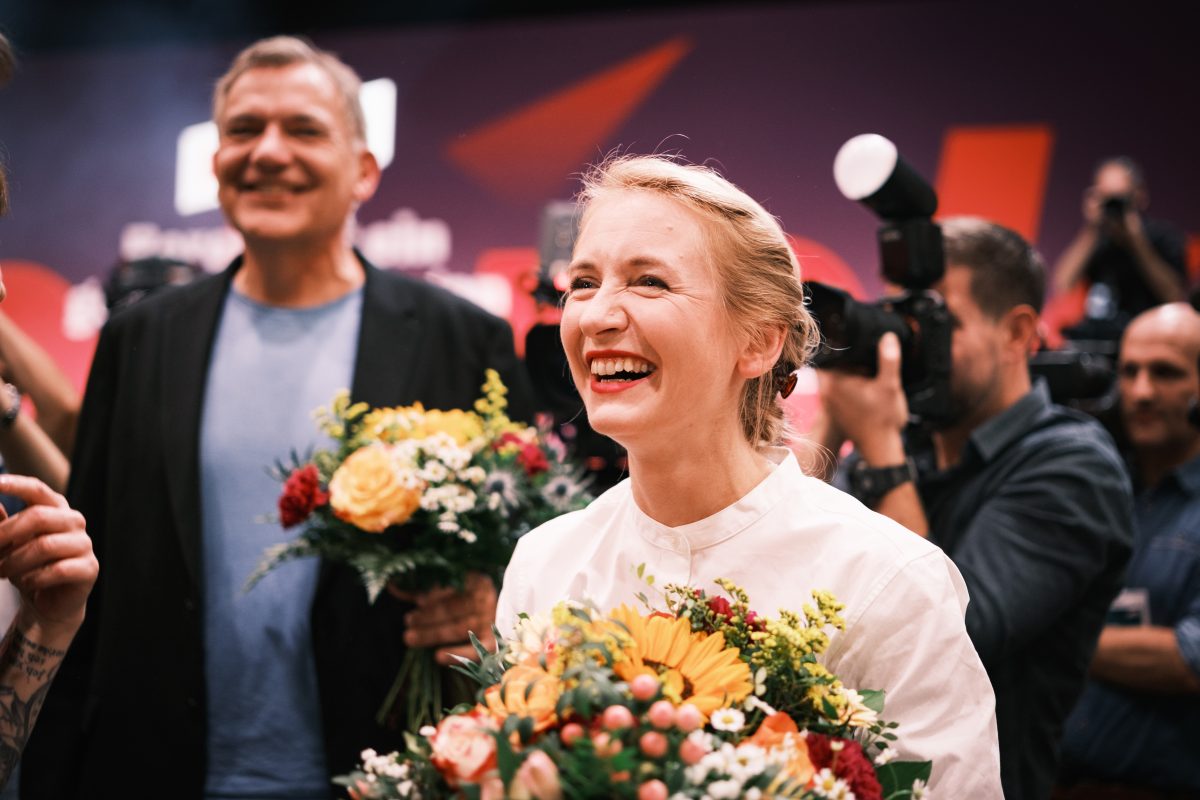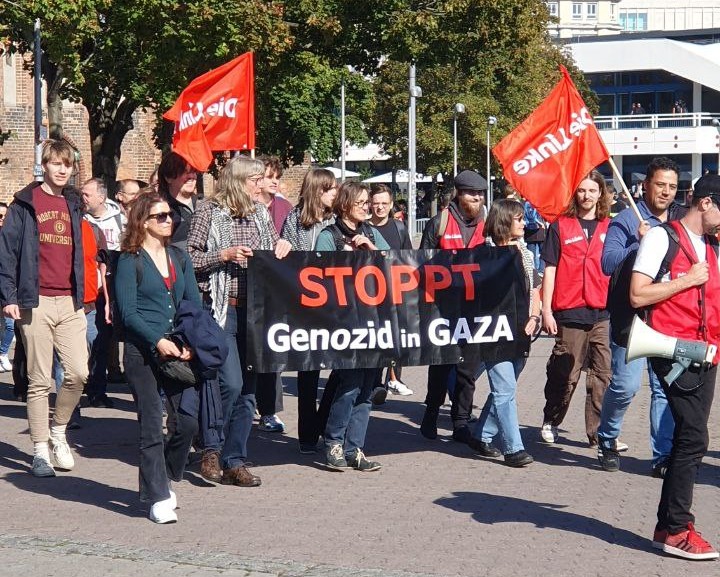The 2022 French presidential elections in April reconfirmed the existence of an electoral left ready to take power in France. Now, sights are set on the June legislative elections; the Popular Union, the strongest force on the French left, seeks to impose parliamentary “cohabitation” to enact ecosocialist domestic policies and counter Macron’s second term.
The First Round
The first round of presidential elections were held on April 10th. Neoliberal incumbent Emmanuel Macron (27,84%), his two-time far-right challenger Marine Le Pen (23,15%), and left-wing firebrand Jean-Luc Mélenchon (21,95%) garnered the highest number of votes, confirming two things: the existence of three main voting blocs that dominate the French electorate and the obliteration of traditional parties like the Republicans (4,78%) and the Socialist Party (1,75%). Mélenchon’s score was surprisingly high given the barrage of media attacks he’s suffered since 2018 due to his critical tone and vociferous opposition to neoliberal elites and unfair if not calumnious characterizations as a supporter of anti-American dictatorships from certain Atlantist factions of the center-left. Final days of polling show him at only 17%, yet the innovative campaigning of “l’Union Populaire,” (including door-to-door canvassing, town-hall meetings all across France, a rally with simultaneous appearances in 12 cities using holograms, and a focus on bread-and-butter social and ecological issues rather than negative attacks on center-left opponents), mobilized hundreds of thousands of supporters to attend in-person events, and trained tens of thousands of new committed activists.
Keeping in mind that 5% of votes are needed to qualify for public campaign funding, if only one minor center-left candidate had dropped out in the last days leading up to the election (as the Greens only received 4.63% and the Communists 2.28%), this would have given Mélenchon the 1.2% more he needed to pass to the second round. As Jacobin Magazine’s David Broder put it, “those who voted Green or especially for the post-Communist PCF should ask themselves whether it was worth it.”
In this scenario, Marine Le Pen would not have continued to the second round, which would have allowed for a productive debate between the top two candidates on such issues as ecological planning and re-industrialization, peaceful and anti-imperialist foreign policy, rebuilding public services, and the like. Instead, dialogue centered around whether wind turbines should be disassembled, if Muslim women should be allowed to wear hijabs in public, and whether France respects the police enough – all topics of Marine Le Pen’s program. Two weeks of campaigning could have prevented the pitfalls of the neoliberal vs far-right duel that Western Europe and North America are dealing with all too often, one election cycle after another.
Demographic Shifts in the Electorate
It’s worth noting that Mélenchon won the most votes among young voters, the educated lower-middle class, and the most precarious citizens who earn under 900 euros a month. Macron’s performance was most effective among the oldest bloc of voters who are retired. The rural/urban divide turned out to be once again one of the clearest indicators of the probability of voting for the far-right, with economically disadvantaged rural and peri-urban areas voting more for Macron than for Le Pen in the second round. The Mélenchon electorate is also particularly strong in the working-class suburbs of large metropolitan areas.
While Mélenchon won majorities in overseas departments like Martinique, Guadeloupe, and French Guyana in the first round, Marine Le Pen won large majorities (accompanied by much abstention) in the second. Their predominantly Afro-Caribbean populations have been gravely affected by high unemployment and ecological degradation. These areas are so neglected by Macron and preceding governments, that within two weeks, the anti-system vote transferred to Marine Le Pen – a xenophobe with no real policies to offer French overseas departments.
The Second Round
A poll from late 2020 showed that 80% of French voters said they did not want to see another Macron vs Le Pen duel, yet the same spectacle from 2017 was repeated. The second round of presidential elections on April 24th saw the re-election of Macron with 58.5% of the vote – with 42% of his voters turning out only to reject far-right candidate Marine Le Pen. Moreover, abstention was at its highest since 1969.
The Benalla affair, McKinsey Gate, the use of private counsels from BlackRock to reform retirement pensions, and a number of other scandals affecting Macron, his ministers, or his associates merit reflection. They also provoke sympathy for anti-system voters and abstentionists who joined the Gilets Jaunes movement in 2018 because they’d had enough of the lies and manipulation used to make ordinary French citizens swallow the pill of neoliberal reforms that break apart the fabric of social services and labor protections won through the struggles of the working class.
Of course, Marine Le Pen continues to be a danger to the already dysfunctional and hyper-centralized institutions of the French republic. Her Citizens’ Initiative Referendums, a proposal of the Gilet Jaune movement that would allow the public to abridge and propose laws directly, did not camouflage her party’s fascist history, its dependence on Russian and Hungarian banks, nor its admiration for those countries’ authoritarianism. She deserved to be defeated and cast away from public light, since her dangerous xenophobia would only repress the working class.
But five years of Macron also paved the way for repression: between the aggrandizement of the police state, increased support for the military-industrial complex, a degradation of democratic norms, or the adoption of far-right talking points by Macron’s ministers, it is increasingly difficult to perceive the difference between Macron and the most reactionary edge of France’s right wing. On top of this, even increasingly ecologically conscious “middle” class voters have reason to feel betrayed by Macron – he was condemned by the Council of State for climate inaction for failing to meet emissions objectives, and rejected or watered down 90% of the propositions brought forth by the Citizens Convention for the Climate.
The legacy of Macron’s first term will certainly continue into his second if a strong left-wing parliamentary opposition is not built in time for the legislative elections in June this year.
Looking Towards the Legislative Elections
In a sense, France’s 2022 elections are not finished – there is a “third round.” A series of legislative elections are set to take place on June 12th and 19th and will determine whether the incumbent president has a parliamentary majority and a prime minister to support his policies. Under the semi-presidential constitution of the Fifth Republic, the president nominates the prime minister, whose role is to implement domestic policies and direct the Council of Ministers. An oppositional majority could hypothetically force Macron to choose a prime minister from their majority in the National Assembly.
The bet taken by l’Union Populaire is as follows: each electoral constituency should vote for their own candidates in order to form the oppositional majority necessary to name Jean-Luc Mélenchon prime minister. Is this an unreasonable bet? In some ways, yes. Most constituencies will be more easily won by large parties and rural constituencies will be overrepresented in relation to their population. But the left has never won with thoughts of defeat. “Mélenchon as prime minister” is a slogan that re-mobilized thousands of militants – both veteran activists and fresh new faces. Given the national media attention and the will of activists to remain civically engaged, there is no reason why Mélenchon and l’Union Populaire should shoot for lower than 50% of seats (289 seats for an absolute majority) in the National Assembly. After all, the left does not exist to simply advocate for workers, the environment, and social justice, but to govern in order to make material changes toward that end.
Projections show that l’Union Populaire is leading in 104 constituencies and in the second round in 423. Polling shows that voters are craving a strong left led by l’Union Populaire. Furthermore, the objective of winning a seat at the table as prime minister also allows voters to make the connection between local legislative candidates of l’Union Populaire and its former presidential candidate, Mélenchon, who has immediate name recognition and renewed popularity.
Inter-party Discussions
Following the first round, l’Union Populaire proposed discussions with parties to the left of Macron’s “La République en Marche,” which include the Greens, the Communists, and the New Anticapitalist Party. Talks are taking place this week to center l’Union Populaire’s demands in the left’s bid to the electorate; “l’Avenir en Commun” (The Future in Common) is a comprehensive program with around 700 unique policy proposals, and will be at the heart of what the left is promising voters. This is only natural, since Mélenchon’s recent electoral score far outweighs those of other parties. These discussions will also be used to reach an agreement so candidates do not compete against each other in the same constituencies. The productive nature of this recent dialogue is already evident: a new accord was drawn up on April 28th between La France Insoumise and Generation.s, a small pro-EU left wing party created by 2017 candidate Benoit Hamon. This shows a new willingness to resist the neoliberal EU treaties constraining pro-social and ecological policies. Discussions with the Parti Socialiste are less productive, however, who are not so open to the terms and political policies of l’Avenir en Commun. Regardless of what federation is created, non-negotiable left-wing policies will inevitably remain anchored to the movement’s program.
We Have a World to Win
Election-watchers who tuned in to April’s presidential rounds should stay tuned for the “third round.” France presents a unique opportunity for the global left: there is reason to be hopeful that this major “Western” power, with its long history of monarchic rule and colonial exploitation of Western Africa, the Maghreb, Indochina, and the like, might one day be reclaimed by its working class for the causes of labor rights, respect for the environment, and peace and diplomacy abroad. If the left can win in France in our lifetime, it is possible for the left to win anywhere.




